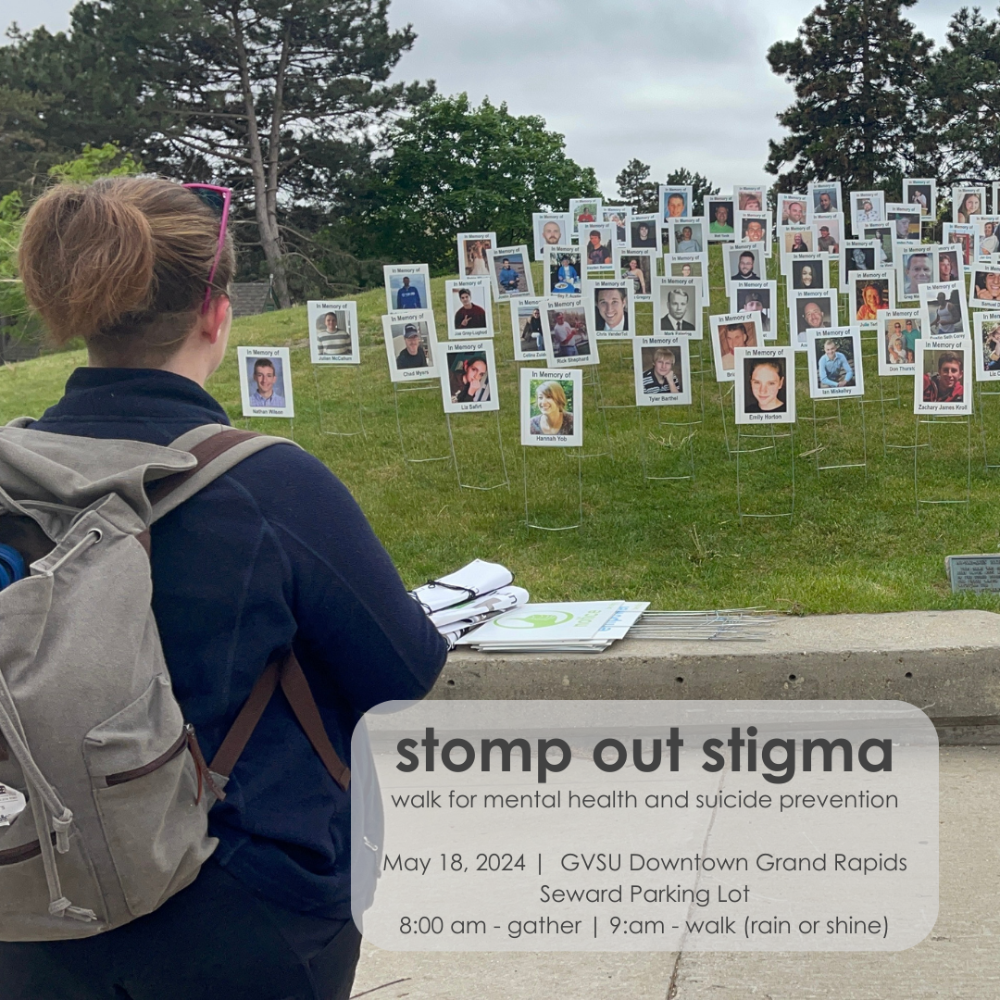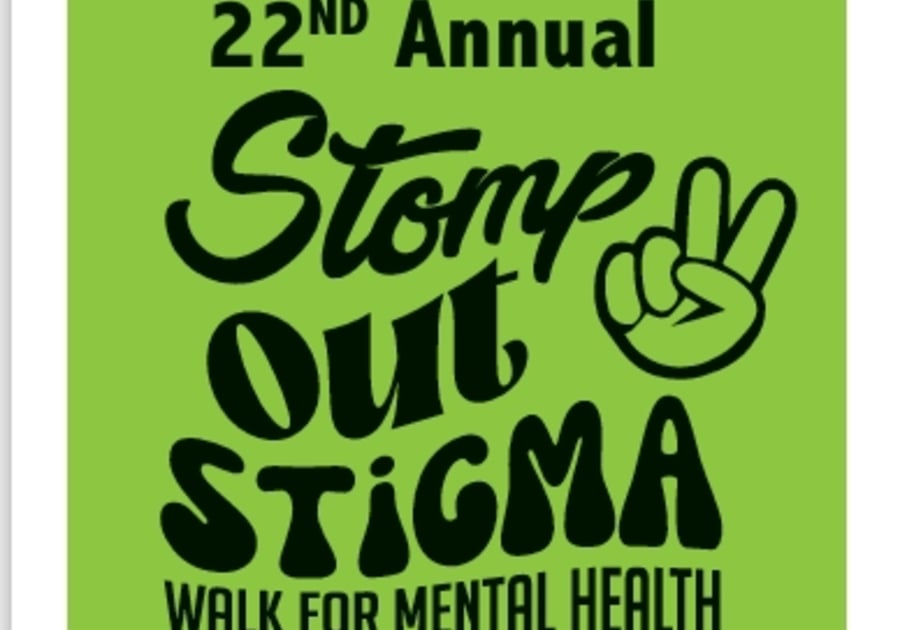May is Mental Health Awareness month. In honor of all who struggle I have decided to walk for awareness. With my team MG 4EVER we will walk in memory of my son and work to bring light to dark situations. He left us unexpectedly last August and I did not pick up on signs detailed below. In hindsight, my son's life long "I got this" attitude seemed masked from age 21 - 22. Living in an extremely stressful environment took a toll on him that I never could have imagined. Please learn about the signs of mental health issues and be open to notice changes in yourself & others as well. The Stomp out the Stigma walk is an event helping the fund the be nice program with the Mental Health Foundation of West Michigan. Read below to learn more.
If you or someone you know would like to donate please click link to SPONSOR MY TEAM.
To JOIN the walk or start your own team please click here.
The “be nice.” Program: Promoting Mental Health Awareness
Introduction
The Mental Health Foundation of West Michigan established the “be nice.” program in 1990 with a powerful mission: to create communities that prioritize good mental health. Through education, awareness, and action, this program aims to inspire individuals to recognize, understand, accept, and take steps to address mental health challenges.
The Four-Step Action Plan
The “be nice.” program revolves around a four-step action plan that has been proven to save lives:
- Notice: Begin by noticing what is right and good about someone. Pay attention to any changes in their behavior, physical appearance, or psyche that might indicate a developing mental health concern. Signs could include withdrawal, mood shifts, or neglect of responsibilities.
- Behavioral signs:
- Quitting favorite hobbies.
- Avoiding social interactions.
- Sudden or unlikely drug or alcohol use.
- Frequent crying without apparent reason.
- Neglecting responsibilities or losing motivation.
- Sleep disturbances.
- Physical signs:
- Lack of hygiene or personal appearance.
- Fatigue and lack of energy.
- Overeating or loss of appetite.
- Unexplained weight changes.
- Headaches or unexplained aches.
- Psychological signs:
- Aggressive behavior.
- Heightened sadness or guilt.
- Lack of emotional responsiveness.
- Frequent self-criticism.
- Thoughts of death or suicide.
- Behavioral signs:
- Invite: Take a risk and reach out. If you notice changes lasting two weeks or longer, it’s time to invite yourself to check in with that person or open up to someone you trust if you are personally struggling. Remember that eight out of ten people considering suicide give some sign of their intentions.
- Social connection improves mental, physical, and emotional well-being.
- Feeling connected reduces anxiety and depression.
- A sense of belonging is essential for coping with painful emotions.
- Challenge: Encourage individuals to challenge themselves and others to seek appropriate professional help when they notice mental health changes or concerns. The be nice. action plan empowers people in schools, businesses, faith institutions, and communities to take action.
- Empower: Equip individuals with the knowledge and confidence to address mental health and suicide prevention. By empowering people to act, we create a positive culture, increase mental health referrals, and foster behaviors that prevent suicide.
Research and Effectiveness
Under the leadership of Executive Director Christy Buck, the Mental Health Foundation enlisted researchers from Grand Valley State University to conduct an evidence-based study. The results confirmed that the be nice. program indeed creates a positive culture, increases mental health referrals, and encourages behaviors that prevent suicide.
Community Impact
Today, more than 128 schools across 18 counties in Western, Eastern, and Northern Michigan actively use the “be nice.” program. Additionally, workplaces and congregations have embraced this initiative, making a significant impact on mental health awareness and support.
Conclusion
The “be nice.” program reminds us that small actions can make a big difference. By noticing, inviting, challenging, and empowering, we contribute to a healthier, more compassionate community. Let’s continue to spread kindness and prioritize mental well-being. 🌈
For more information, visit the Mental Health Foundation of West Michigan website1.
Remember, you can be part of the change today! 🌟

Depression can affect individuals of all ages, and its onset varies across different life stages. Let’s explore how depression manifests in different age groups:
- Children:
- Depression is less common in children under 12, but it does occur.
- Signs include:
- Problems at school.
- Loss of interest in fun activities.
- Changed eating habits.
- Weight gain or loss.
- Clinginess.
- Anxiety.
- Difficulties with family members.
- Avoidance of school and social activities.
- Triggers can include domestic violence, parental depression, family stressors, abuse, learning problems, and significant life changes.
- Early intervention through therapy is crucial for children.
- Teens:
- Adolescents (ages 12 to 18) experience wide mood swings, but it’s essential to watch for signs of depression.
- Red flags include:
- Mood changes lasting longer than a few weeks.
- Problems at school, home, or with friends.
- Irritability and lashing out.
- Feelings of worthlessness and anger.
- Changes in sleep or eating patterns.
- Avoidance of friends and activities.
- Self-harm behaviors (e.g., cutting).
- Pressures to fit in, hormonal changes, lack of sleep, and peer rejection contribute to teen depression.
- Young Adults (Ages 19 to 29):
- Major life transitions, lack of support, relationship issues, poverty, and work-related stress can lead to depression.
- Building a support system and preparing for life changes are essential during this phase.
- General Statistics:
Remember that seeking professional help and fostering connections play a crucial role in managing depression at any age. If you or someone you know is struggling, consider reaching out to a mental health professional or a trusted person in your life. 🌟



